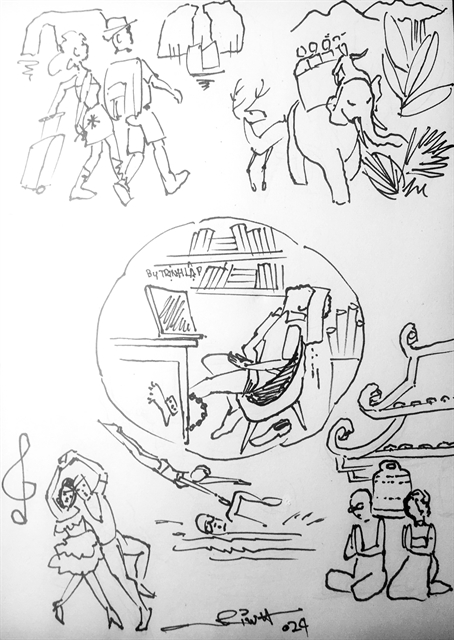
Illustration by Trịnh Lập
by An Phương
Recently, the phrase "healing" has become a hot topic and a catchphrase among the online community.
As social media became an outlet for people stuck at home during the pandemic, many progressively became more open about their mental health issues, sharing their experiences on various platforms including TikTok.
"Healing" has emerged as a comforting message for young people, especially Gen Z, who are often described as tech-savvy, creative, and independent, yet also experience emotional distress. This message is conveyed through diverse content and forms with a positive spirit.
“Seeking comfort and healing for physical and mental wounds, discarding negative thoughts and feelings, and leading a more meaningful life are common needs among the youth,” my friend Thắng Nguyễn, 31, tells Việt Nam News.
Thắng currently works at a renowned marketing agency in HCM City and frequently interacts with young colleagues.
He says that various "healing" methods and services, such as travelling, reconnecting with nature, participating in social activities, meditation, listening to podcasts, and tarot reading, have been embraced by many young people as ways to mend psychological wounds or escape the pressures and stresses of their current lives, including financial and work-related pressures.
My best friend’s sister, Thanh Trần, 23, is experiencing significant stress from work and family pressures.
"At a relatively young age, I always feel exhausted due to my dense work schedule. The pressures from superiors and financial stress force me into a nonstop cycle, leaving no time for rest. I work 14 hours a day and only get Sundays off," she says.
Feeling overwhelmed, Thanh asked her boss for a week off to go on a "healing" trip, hoping to feel relaxed, soothe the pressures and negative emotions, and to regain her work spirit.
I empathise with Thanh's experience because I have also faced burnout and taken time off to recharge on a healing trip.
That being said, despite "healing" being initially embraced as a genuinely positive message, many people have become increasingly tired of it, sometimes mentioning healing with a sarcastic attitude.
It has become a bit of a cliché on social media, with people claiming that every little thing they do is 'healing,' even when they're not truly experiencing any mental distress. Some seem to use it solely for attention.
Thắng's observation about social media is spot-on: While it has helped reduce the stigma surrounding mental health, it's also glamourised and romanticised it to some extent.
In psychological terms, genuine healing takes time, akin to the recovery process of a physical wound. While using the term for relaxation and comfort is fine, it is important not to overuse it and dilute its significance.
I have observed numerous discussions on this topic and have come to realise that it has become highly contentious.
While the need for individuals to engage in healing is understandable, it is crucial to consider how their healing processes may impact others.
"Everyone should be mindful of their surroundings and responsible regarding work ethics,” Thắng says.
Giang Trần, 28, a mutual friend of Thắng and me, says that she has experiences with young colleagues who use the need for healing to “ghost” and abandon their team tasks.
“Since I was the one who led the project and was fully responsible for any outcome, my colleague’s healing process took a toll on my ability to complete the task and, consequently, my mental health,” she says.
"I felt it was unfair that everyone was paid the same at the end of the day, while I had to work more," Giang adds.
We all agree that not every issue requires healing.
“If it doesn't stem from genuinely serious psychological problems, the constant pursuit of healing by young people can hinder their development,” Thắng says.
Meanwhile, Thanh believes that mastering pressure and maintaining mental balance require young people to actively strive for self-improvement.
"It is one of my primary personal development goals I have set for myself this year," Thanh affirms.
In my opinion, rather than solely focusing on healing, individuals should nurture ambition and pursue their aspirations.
“Each individual should embrace a healthy lifestyle, which includes moderating the use of electronic devices, participating in physical exercise, and abstaining from stimulants," Thắng comments.
He emphasises the importance of assessing whether one's living environment aligns with their strengths, personality, and abilities.
“The trend of misusing healing as a means to evade challenging realities, as observed in some young people today, is not advisable,” Giang cautions.
“As much as I empathise with my Gen Z colleagues, I believe our country cannot cultivate a strong and mature younger generation if this trend persists. While youth presents numerous opportunities, seizing them is imperative for success,” she adds.
Instead of healing, we need to make ourselves stronger and more resilient to overcome challenges and reach the finish line like marathon runners. At the end of the journey, life will reward us with a medal called "no regrets."
In my humble experience, young people should recognise that not every setback requires extensive healing. Healing should be reserved for those who are genuinely struggling and wounded.
Once healed, it is crucial to recommit oneself to work and life with a positive mindset and proactive attitude.
Merely healing without subsequent dedication and effort may not truly constitute healing at all. - VNS
OVietnam